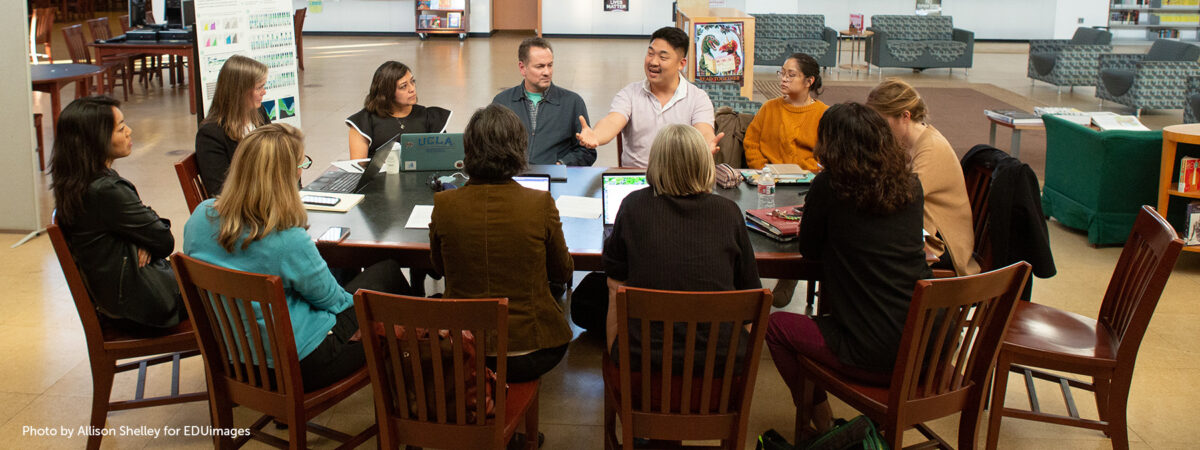
When it comes to researching how we learn, educators must be in the loop. At Digital Promise, our Learning Sciences Research (LSR) team connects with networks of educators and educational leaders to bring research-based knowledge into practice.
By bridging the gap between researchers and practitioners, our researchers:
Included here are three examples of how our LSR researchers collaborate with practitioners to expand opportunities for every learner.
The OpenSciEd Research Community project connects innovators, researchers, practitioners, and policymakers to support the widespread adoption of OpenSciEd, a set of freely available curriculum materials addressing the Next Generation Science Standards (NGSS). Practitioner engagement is key to help shape the project’s research questions.
Practitioners provide invaluable insights into what works—and what doesn’t—when implementing the OpenSciEd curriculum. Our researchers began by conducting surveys and focus groups with practitioners to discuss their challenges implementing the OpenSciEd curriculum, such as the need for more lesson-planning time. These efforts help researchers identify areas of investigation to support the broader rollout of OpenSciEd curriculum in schools.
“The voices and perspectives of practitioners are necessary for conducting high quality research in schools,” said Kevin McElhaney, director of science and engineering education research, who leads the project. “Our conversations with teachers and leaders point to important research questions, provide unique insights about students and how to meet their needs, and inform solutions to make curriculum implementation coherent and sustainable.”
Based on these conversations, the OpenSciEd Research Community team has a forthcoming report synthesizing what they have learned from practitioners. They will also release a guide to help education systems leaders, teachers, and researchers clarify challenges and identify opportunities to expand the implementation of OpenSciEd.
World history is a vast topic, and for many teachers of the subject, it can be challenging to foster meaningful discussions among their students. Researchers involved in Deeper Discussions in World History, a joint project between Digital Promise’s LSR team, the Center for Inclusive Innovation, the OER Project, and the University of Pennsylvania Graduate School of Education, are designing materials to help teachers deepen world history discussions in their classrooms.
To create these resources, researchers have spent the last year collaborating with a cohort of teachers to co-design culturally responsive world history materials. This co-design process is iterative: researchers and practitioners co-design lesson plans, practitioners test them in the classroom, and researchers modify materials based on feedback. Researchers and teachers also gather annually for in-person design workshops to further foster collaboration.
Reflecting on the co-design process, teacher Daryn Cohen said: “In terms of being treated like a professional, it has really helped build community. Everyone feels very valued, and that’s really important in making it a community of everyone, and not just teachers over here and researchers over there.”
Using feedback from the co-design process, researchers will develop two resources: Deeper Discussions, a suite of world history curricula, and a professional development toolkit to help high school world history teachers facilitate powerful discussions in their classes and promote historical thinking for students.
Our researchers are also engaging teachers of science, technology, engineering, and math (STEM). Learning sciences research often leads to discoveries that impact how teachers teach, but it can be difficult for teachers to understand these research findings, let alone implement them in their classrooms.
To address this issue, researchers in the Mapping, Clarifying, and Communicating Key Ideas about Collaborative Learning to STEM Audiences (MC2) project are bringing together researchers and practitioners (teachers and coaches) to co-develop materials that will translate research on collaborative learning for one of its most important audiences: educators.
Judi Fusco, who leads the MC2 project, is passionate about closing the gap between researchers and STEM educators. “Both researchers and practitioners have invaluable insights on learning with few occasions to share with each other,” she said. “The MC2 project bridges that gap by creating opportunities for meaningful collaboration to occur.”
Educators have been significantly involved in the MC2 project. Initially, a panel of researchers and practitioners worked together to determine topics from collaborative learning research relevant to classroom practice. Now, practitioner and researcher experts are creating “primers” that will translate key research findings on collaborative learning, which can then be used to develop research-based materials for use in the classroom.
By working, discussing, and writing together, researchers and practitioners can better understand each other’s perspectives and how each thinks about collaborative learning. Following co-development, the project team will conduct an additional review to ensure primers include perspectives from both groups and that the additional research-based materials will be truly usable by the educator community.
Educators have an essential role in shaping learning sciences research. Their partnership ensures that our researchers conduct works that meaningfully impacts students and teachers.
Want to learn more about Digital Promise’s learning sciences research work?